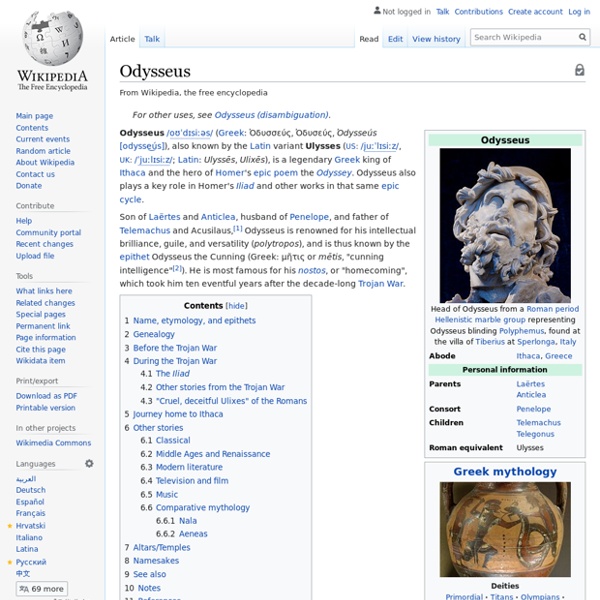Homer, The Iliad, Scroll 13
Scroll 13 Now when Zeus had thus brought Hektor and the Trojans to the ships, he left them to their never-ending toil [ponos], and turned his keen eyes away, looking elsewhere towards the horse-breeders of Thrace, the Mysians, fighters at close quarters, the noble Hippemolgoi, who live on milk, and the Abians, the most just [dikaioi] of humankind. He no longer turned so much as a glance towards Troy, for he did not think that any of the immortals would go and help either Trojans or Danaans.
Tydeus
Tydeus and Ismene. Side A from a Corinthian black-figure amphora, ca. 560 BC. In Greek mythology, Tydeus (/ˈtaɪdiəs, -djuːs, ˈtɪdiəs/; Ancient Greek: Τυδεύς Tūdeus) was an Aeolian hero of the generation before the Trojan War. He was one of the Seven Against Thebes, and the father of Diomedes, who is frequently known by the patronymic Tydides. Mythology[edit] Exile[edit]
Transparent to Transcendance - Joseph Campbell Foundation
Hello Finegas! Thanks, Tom, for your long reply. Your references to Joyce/Aristotle and the asthetic experience are fine.
Homer, The Iliad, Scroll 14
Scroll 14 Nestor was sitting over his wine, but the cry of battle did not escape him, and he said to the son of Asklepios, "What, noble Machaon, is the meaning of all this? The shouts of men fighting by our ships grow stronger and stronger; stay here, therefore, and sit over your wine, while fair Hekamede heats you a bath and washes the clotted blood from off you. I will go at once to the look-out station and see what it is all about."
Diomedes of Thrace
Hercules and Diomedes, from a 16th-century original at the Palazzo Vecchio in Florence, Italy; one of six marble statues representing "The Labours of Hercules" by Vincenzo de' Rossi.[1] Mythology[edit] Heracles encounters King Diomedes through performing his eighth labour. Eurystheus, King of Tiryns and Heracles cousin, had sent Heracles to capture the Mares of Diomedes after he had completed his seventh labour, capturing the Cretan Bull.
Julius von Mayer
Julius Robert Mayer (25 November 1814 – 20 March 1878) was a German physician, chemist and physicist and one of the founders of thermodynamics. He is best known for enunciating in 1841 one of the original statements of the conservation of energy or what is now known as one of the first versions of the first law of thermodynamics, namely that "energy can be neither created nor destroyed".[1][2] In 1842, Mayer described the vital chemical process now referred to as oxidation as the primary source of energy for any living creature. His achievements were overlooked and priority for the discovery of the mechanical equivalent of heat was attributed to James Joule in the following year. He also proposed that plants convert light into chemical energy. Early life[edit]
Seduction
Seduction is the process of deliberately enticing a person, to engage in a relationship, to lead astray, as from duty, rectitude, or the like; to corrupt, to persuade or induce into engaging in sexual behaviour. Strategies of seduction include conversation and sexual scripts,[1] paralingual features,[2] non-verbal communication,[3][4] and short-term behavioural strategies.[5] The word seduction stems from Latin and means literally "leading astray."[6] As a result, the term may have a positive or negative connotation. Famous seducers from history or legend include Lilith, Giacomo Casanova, and the fictional character Don Juan. The emergence of the Internet and technology has supported the availability and the existence of a seduction community, which is based on discourse about seduction.
Trojan War
Mythological war Whether there is any historical reality behind the Trojan War remains an open question. Many scholars believe that there is a historical core to the tale, though this may simply mean that the Homeric stories are a fusion of various tales of sieges and expeditions by Mycenaean Greeks during the Bronze Age. Those who believe that the stories of the Trojan War are derived from a specific historical conflict usually date it to the 12th or 11th century BC, often preferring the dates given by Eratosthenes, 1194–1184 BC, which roughly correspond to archaeological evidence of a catastrophic burning of Troy VII,[4] and the Late Bronze Age collapse. Sources
The Koshas: 5 Layers of Being
If you’re a typical health-conscious Yoga International reader, you've probably already exercised today. Whether you went for a brisk walk, played some tennis, or worked out at the gym, you recognize the importance of keeping your physical body in shape. But have you exercised your subtle body yet? Or your causal body?
Poseidon
Ancient Greek god of the sea, earthquakes and horses Poseidon was protector of seafarers, and of many Hellenic cities and colonies. Homer and Hesiod suggest that Poseidon became lord of the sea following the defeat of his father Cronus, when the world was divided by lot among his three sons; Zeus was given the sky, Hades the underworld, and Poseidon the sea, with the Earth and Mount Olympus belonging to all three.[2][5]In Homer's Iliad, Poseidon supports the Greeks against the Trojans during the Trojan War and in the Odyssey, during the sea-voyage from Troy back home to Ithaca, the Greek hero Odysseus provokes Poseidon's fury by blinding his son, the Cyclops Polyphemus, resulting in Poseidon punishing him with storms, the complete loss of his ship and companions, and a ten-year delay.



